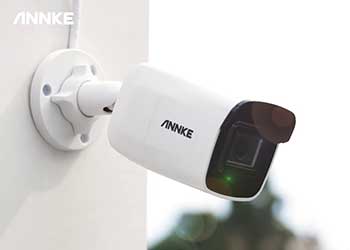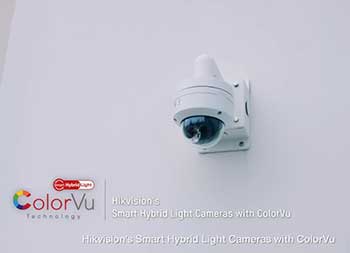When it comes to home or business security camera systems, Annke and Hikvision are two of the most well-known brands on the market. But which one offers the better features, reliability and value for your money?
This comprehensive guide examines the pros and cons of both Annke and Hikvision camera systems to help you decide which is the right choice for your needs.
A Brief Comparison Table
| Feature | Annke | Hikvision |
| Video Quality | 1080p HD | Up to 4K Ultra HD |
| Lens Field of View | 90-100° | 110-180° |
| Low Light Video | Good | Excellent with Ultra HD models |
| Smart Detection | Motion, person | Motion, person, vehicle, smart tracking |
| Audio | Two-way | Two-way with noise cancellation |
| Weather Resistance | IP66/IP67 | IP66/IP67 |
| Warranty | 1-2 years | 2-3 years |
| Pricing | $50-$300 per camera | $100-$500+ per camera |
| Applications | Home use, small business | Enterprise, high-end installations |
Overview Of Annke And Hikvision

Annke is a company founded in 2008 that designs and manufactures wired and wireless security camera systems for home and business use. Their product line includes IP cameras, NVRs, video doorbells and accessories. Annke emphasizes easy setup, affordability, high-quality HD video and advanced features like smart motion detection.
Hikvision is a surveillance equipment manufacturer founded in 2001 in China. They make a wide range of security and surveillance products including cameras, NVRs, DVRs, facial recognition systems and more. Hikvision is known for high-quality imaging, advanced technology like 4K video and smart analytics, and robust construction for outdoor and commercial environments.
Also Read: Comparison Between Blink and Yi cameras
Detail Comparison Of Annke And Hikvision
Video And Image Quality
When comparing security cameras, video and image quality should be a top consideration. Both Annke and Hikvision cameras deliver excellent high-definition 1080p video, but there are some differences in imaging sensors and other factors affecting quality:
- Low light video – Hikvision excels in low light conditions with ultra HD and 4K cameras using powerful Sony imaging sensors and WDR technology. Annke cameras perform reasonably well at night too but can’t match Hikvision’s dark environment video.
- Field of view – Annke cameras typically have 90-100° field of view while Hikvision offers wider 110-120° views with some 4K models having 180° fisheye lens views. The wider field of view can capture more of a scene.
- Analytics – Hikvision has leading video analytics for things like human and vehicle detection. This allows for smarter motion alerts and video searches. Annke has decent video analytics too but not as advanced.
- HDR – Both brands offer HDR imaging for improved video in high contrast lighting. Hikvision’s HDR performance results in clearer, better exposed images in testing.
So for the absolute best video quality, especially in dark conditions or for wide area coverage, Hikvision cameras have a slight edge. But Annke cameras still produce very good 1080p HD video that will suit most users’ needs.
Smart Features
Today’s security cameras provide all kinds of smart features powered by integrated AI and advanced technology. Here’s how Annke and Hikvision compare when it comes to their smart capabilities:

- Motion detection – Both brands have motion detection that enables the camera to send alerts and record video when movement is detected in the camera’s field of view. Annke and Hikvision motion detection works reliably in most cases.
- Person/vehicle detection – Hikvision cameras have very accurate AI person and vehicle detection. Annke cameras can detect people too but not as consistently in testing. Hikvision’s superior detection can reduce false alerts.
- Audio – Many Annke and Hikvision cameras support two-way audio communication through a built-in mic and speaker. Hikvision also offers noise cancelling microphones on some models for better audio quality.
- Night vision – Both provide excellent night time viewing with IR cut filters and LEDs or spotlights. Annke typically has 65-100′ night vision range while Hikvision can reach up to 300′.
- Smart tracking – Some Hikvision cameras have auto-tracking to follow a person or vehicle in motion across the camera’s field of view. This feature isn’t found on Annke cameras currently.
- Cloud storage – Annke and Hikvision cameras can record to the cloud for storage and monitoring from anywhere. Third party options like Dropbox are supported. Hikvision’s own cloud platform Ezviz offers generous free cloud storage.
Annke does have some unique smart features like a humanoid shape detection model on certain cameras. But Hikvision cameras come out ahead overall for their superior motion detection, person/vehicle identification and smart tracking capabilities.
Also Read: Choose Between Geeni And Ring.
Reliability And Durability
Reliability and durability are crucial for security cameras that will be operating 24/7. Here is how Annke and Hikvision compare:
- Construction – Both brands use durable metal housing on most outdoor and high-end models. Many also have IK10 vandal resistant ratings against impact, though Hikvision offers a few cameras with IK10+ vandal proofing.
- Weather resistance – Annke and Hikvision outdoor cameras provide IP66 or IP67 waterproof and dustproof ratings across product lines. They can withstand rain, snow, dust and temperature extremes.
- Power – Hardwired PoE models offer the most reliable continuous power source. Annke has more PoE cameras while Hikvision emphasizes WiFi battery powered cameras. For WiFi cameras, Hikvision battery life is better at several months compared to weeks for Annke.
- Warranty – Annke provides 1 or 2 year manufacturer warranties on cameras. Hikvision’s warranty coverage spans 2 or 3 years for most models. Extended warranties are available.
Both brands build weatherproof cameras designed to hold up well outdoors. Hikvision gets the edge for higher vandal resistance ratings and longer battery life on WiFi cameras. But Annke PoE cameras offer reliable 24/7 hardwired power.
Ease Of Use
Easy setup and management are important considerations for consumer home security cameras. Here is how Annke and Hikvision security systems compare in terms of usability:
- Installation – Annke and Hikvision offer similar easy, DIY installation. WiFi cameras only require camera mounting and power. PoE cameras involve running Ethernet cabling back to an NVR but this is straightforward.
- App interfaces – The Annke Vision and Hik-Connect apps both provide clean, modern interfaces that make accessing your cameras a breeze on smartphones. Annke’s interface has a slight edge for beginner-friendliness.
- Remote access – View live or recorded video anywhere via the apps for both brands. Annke and Hikvision also work with Alexa and Google Assistant for display on smart displays.
- Motion zones – The apps allow you to designate custom motion detection zones. Annke makes it a little easier to set motion zones visually.
- Alert notifications – Get motion alerts and review footage quickly in the app. Annke allows customizing motion detection sensitivity a little more in app.
- Storage – Annke Vision NVRs provide preinstalled hard drives for recording. Most Hikvision systems require installing your own HDD into the NVR.
For the most user-friendly experience out of the box, especially for beginners, Annke has a slight advantage. But both brands offer easy mobile access and intuitive interfaces.
Cost And Value
When comparing Annke Vs. Hikvision, cost is often a primary factor. Here’s how the brands stack up in terms of pricing and overall value:
- Camera pricing – Annke cameras are more budget-friendly, with most models ranging from $50-$300. Hikvision cameras cost anywhere from $100 on up to $500+ for top-of-the-line options.
- System bundles – Annke packages that include cameras, NVR and cables start under $300. Hikvision bundled systems with multiple cameras and NVR are $600+.
- Subscription fees – Annke provides free cloud storage with limited retention. Hikvision gives users complimentary cloud storage with event-based clips saved for two days. For longer storage, fees apply. Locally recorded video has no fees.
- Value – Both brands provide excellent value. Annke is the most wallet-friendly for anyone seeking good quality on a budget. Hikvision offers greater capabilities and performance for those willing to pay more.
For shoppers seeking the lowest upfront prices, Annke is the most budget-conscious choice while still delivering good HD video and features. Hikvision offers a superior experience yet at 3-4x the cost in many cases.
Also Read: Comparison Between Lorex And Annke.
Which Is Better For Home Or Business Use?
Annke and Hikvision cameras can both work well for home and business security applications. However, there are some factors that make each brand better suited for specific uses:
- Home security – Annke is ideal for homes due to very easy installation, intuitive mobile app, affordable camera/system bundles and helpful features like free cloud storage. Hikvision excels too but is overkill for many homeowners.
- Business security – Hikvision is preferable for businesses requiring expansive coverage, top-notch image quality in all conditions, durability against vandalism, and smart capabilities like advanced analytics. The higher costs are justified by Hikvision’s superior performance and reliability for commercial applications.
- Budget deployments – Annke shines when low cost is the priority including multi-unit properties or cost-conscious businesses. The wallet-friendly prices and DIY installation make Annke systems easily scalable.
- High-end installations – For critical environments like warehouses, retail stores, etc. needing best-in-class imaging and intelligence, Hikvision’s state-of-the-art cameras are worth the investment.
In summary, Annke hits the sweet spot for easy home security. Hikvision excels for businesses or the most advanced camera functionalities thanks to robust construction and smarts.
Also watch the video of Annke!
Frequently Asked Questions (FAQ)
No, Annke and Hikvision are separate security camera manufacturers based in China. They compete with somewhat overlapping product lines covering both consumer and commercial surveillance cameras and systems.
While Hikvision makes some of the best security cameras overall in terms of video quality, construction and smart features, some brands do beat them in certain areas. Axis cameras have better analytics. Vivotek offers higher cybersecurity. Dahua provides better value. But no brand clearly surpasses Hikvision across the board.
Hikvision could reasonably be considered the top CCTV camera brand thanks to excellent imaging sensors, durable construction suited for commercial use, and high-end capabilities like 4K resolution, smart person/vehicle detection, auto-tracking and built-in storage. However, many other top CCTV brands like Dahua and Axis are on par with or even slightly better than Hikvision in some aspects.
While Hikvision is based in China, they manufacture innovative, high-quality cameras used worldwide. There were past concerns about cybersecurity vulnerabilities and potential Chinese government surveillance with Hikvision products. However, independent testing has found Hikvision cameras to be secure. There are no known cases of actual spying. So Hikvision can be trusted as much as any other leading video surveillance brand. Proper cybersecurity practices are still recommended as with any IP camera system.
Also Read: Comparison Between Lorex And Simplisafe.
Conclusion
Annke and Hikvision both make excellent security camera systems. For most homeowners, Annke is the best bang-for-your-buck choice that still delivers good 1080p video and handy features. If you need premier imaging quality and advanced analytics, Hikvision justifies the higher costs for business-class performance, especially in challenging deployment environments. Ultimately your specific needs will determine whether Annke or Hikvision is the superior security camera brand for you. This breakdown of their respective strengths and weaknesses makes it easier to pick the right system for your surveillance requirements.
